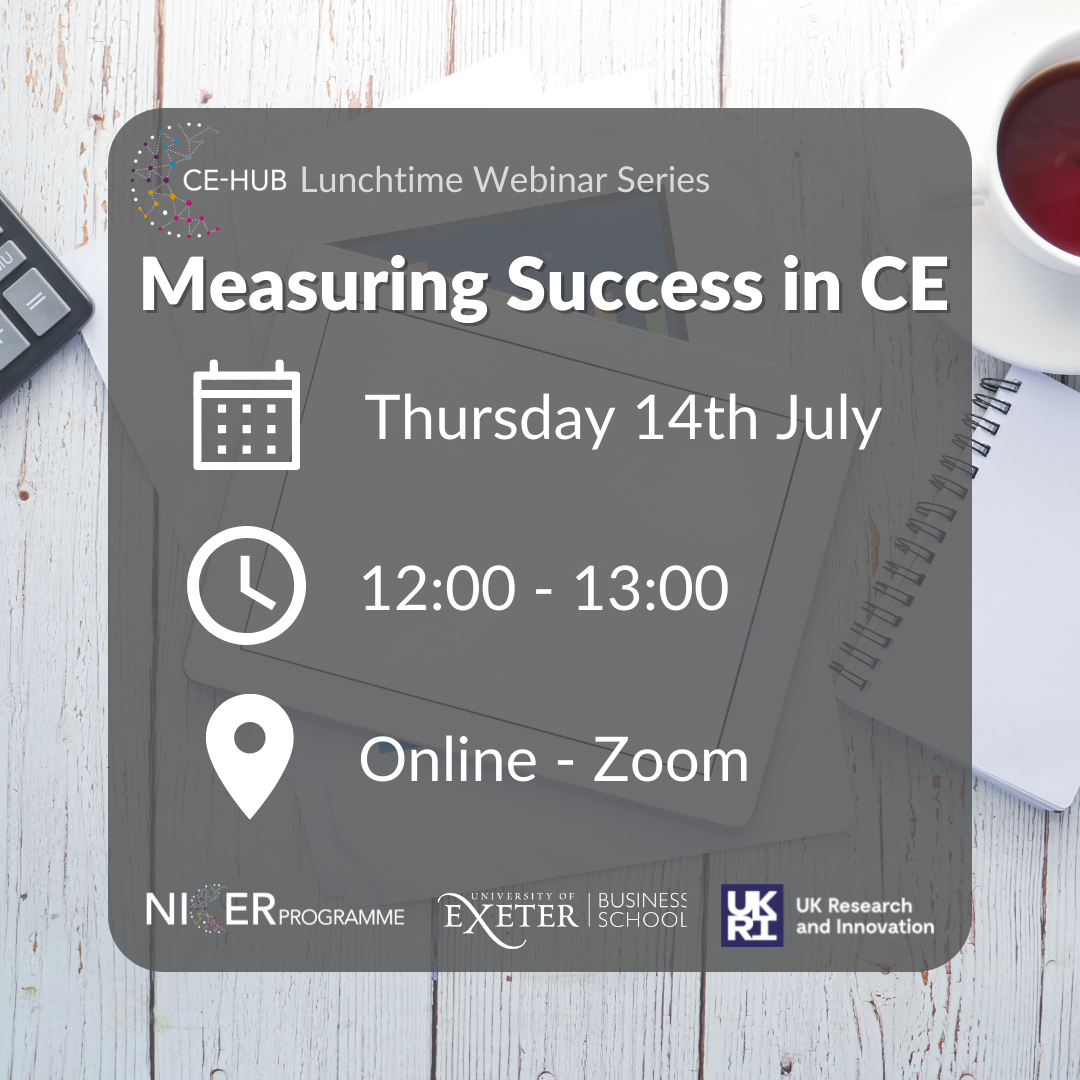Measuring Success in CE – CE-Hub Lunchtime Webinar Series
As increasing numbers of industries, businesses and governments look to better understand the impacts of a circular economy, understanding how we collect data, monitor and measure the impact of circular interventions is key. Measuring our impact enables us to build evidence and understanding of our successes when we implement circular activity.
Professor Peter Hopkinson, co-director of the CE-Hub and Data Research lead led a lively lunchtime webinar with four expert speakers covering different metrics and data collection tools, as well as real-life example with Revolution-ZERO.
Key discussion topics of the webinar included:
- Precompetitive Data Collection and Product Circularity Data Sheets with Katja Hansen – Data collection is expensive, non-standardised and current standards lack information on circularity so we lose a lot of data in the linear economy supply chain. Katja shared a video intrdoucing the Product Circularity Data sheets which can be viewed here.
- Circular Revenue with Philips – exploring revenue based target to support Sustainable and Responsible Business Growth. More information on CE at Philips and their revenue based metrics can be found on their website.
- Tools to measure CE effectively – The GaBi Circularity Toolkit, utilising LCA as a basis for measuring circularity. The tool supports businesses in measuring circularity as part of Environmental, Social and Governance performance (ESG). More information on measuring circularity performance is available on the Sphera website.
- Reducing single-use medical textiles in the NHS – Revolution-ZERO are working closely with medics and the University of Exeter to build a whole-system to reuse, repurpose and recycle medical materials. A Full report is to be published soon, more information can currently be found on the Revolution-ZERO website.
Following presentations from our panellists, the very lively audience Q&A raised questions on a variety of topics including material passports, block chain technologies, measurement of wider impacts and accessibility of available tools.
Watch the Webinar RecordingMeasuring Success in CE Panellists
Katja Hansen, Mulhall & Hansen Beneficial Footprint
Katja Hansen is a leading practitioner, executive trainer, mentor and author in product & process innovation and infrastructure development using the Cradle to Cradle (C2C) Design framework that forms the basis for the Circular Economy. She has worked across many different industrial sectors and has specialized expertise in the build environment and biological systems, for example with bio-based materials, wastewater re-use and improving soil quality in urban environments. She is has been a long-time lecturer at the Exeter EMF CE Masterclass. She will introduce product circularity datasheets (PCDS), a Luxembourg initiative to standardize data collection for the circular economy, which she co-developed.
Atta Ajayebi, Sphera
Atta is a Sustainability Consultant at Sphera. He is experienced researcher with a history of working on the sustainability of economic systems. He is skilled in supporting the transition towards a Circular Economy, utilising Life Cycle Assessment (LCA), Energy, and environmental engineering. Atta has more than 10 years of professional experience in LCA and other sustainability assessment metrics and methods such as Material Flow Analysis, Natural Capital assessing, Spatial analysis and Circularity indicators.
Sophie Thornander, Philips
Sophie is Program Manager Circular Economy & Transformation at Philips, driving the agenda for two key sustainability programs at Philips. For Circular Economy, this includes key topics such as closing product loops, product & business model design and building global coalitions. For Transformation, this includes engagement and communication to empower employees to realise their purpose and actively contribute to Philips sustainability ambitions. These projects support digital businesses on sustainability, from target-setting to co-creating how digital can contribute to sustainability.
Tom Dawson, Revolution-ZERO
Tom Dawson is the founder of Revolution-ZERO, a net zero, circular economy focused PPE solution. He has over 25 years of life and physical sciences experience delivering solutions for government, industry and third sector organisations.
View our upcoming events



